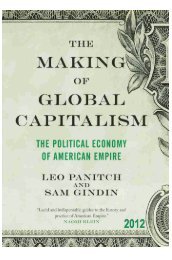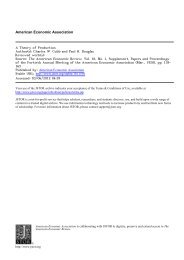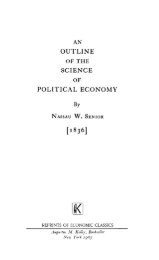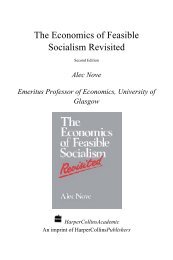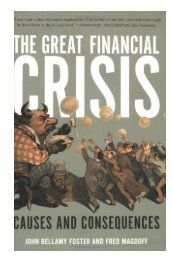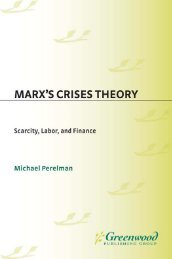128 <strong>Piero</strong> <strong>Sraffa</strong><strong>Sraffa</strong> raised against the Marshallian theory of the firm (contradictionbetween the hypothesis of competition and the ceteris paribus hypothesistypical of partial equilibria) are sometimes said to hold in relation topartial equilibrium analysis, but to be irrelevant to ‘truly general’ analysis,which is the only analysis legitimate for the pure theoretician. 22Much the same evaluation is advanced with regard to the ‘Cambridge’criticism of the aggregate concept of capital, merely conceived as a simplifiedparabola, a ‘low level theory’ compared to the ‘true’ theory, i.e.,general equilibrium. 23In every field of science the idea that a general, all-embracing theoryis superior to ‘partial’ theories has shown its appeal. The problemhere – at least as far as the marginalist approach is concerned – is thatwe must sacrifice to the fetish of a general theory, either rigour (in thecase of ‘parables’) or relevance (since the theory of general equilibriumprovides scant heuristic scope, once the multiplicity and possible instabilityof equilibriums are granted, and has nothing to do with the realworld once we recognise the need for hypotheses on the convexity ofproduction and consumption sets, corresponding to the hypothesis ofgeneralised decreasing returns for production and consumption alike).This is no new problem. It has been addressed on various occasions inthe philosophical and epistemological debate, and it is worth recallingthat, thanks to his influence on Wittgenstein, <strong>Sraffa</strong> played a veryimportant role in this field too.As mentioned earlier (§ 2.2), Wittgenstein’s change of views, whichtook place under <strong>Sraffa</strong>’s influence, can be seen in the light of comparisonbetween the methodology of general economic equilibrium analysisand a methodology of distinct and separate pieces of analysis, which inour interpretation underlies <strong>Sraffa</strong>’s approach.Let us recall Wittgenstein’s (1921) initial view, based on a correspondencebetween the ‘facts’, constituting the world, and ‘propositions’,constituting our image of the world, so that we can describe the world22Cf. Samuelson (1987: 458–9); Newman and Vassilakis (1988). Actually, asalready stressed earlier (§ 1.3), the criticisms posed by <strong>Sraffa</strong> in the articles of1925 and 1926 are far more radical, regarding the very foundations of any analysisbased on functional relationships between cost and quantities produced andthe hypothesis of the convexity of production sets.23In reality the ‘Cambridge’ criticisms only initially concerned the aggregateconcept of capital (Robinson 1953); after the publication of <strong>Sraffa</strong>’s book (andof Garegnani 1960) the emphasis shifted to the concept of capital as a factor ofproduction (and, correlatively, to the notion of profit as the price for the serviceof this factor of production). Cf. Chapter 6.Interpreting Production of Commodities 129with a set of propositions, each one describing a ‘fact’. The set of all ‘true’propositions constitutes, in a sense, our general theory of the world; onlywhat cannot be the object of such a representation (‘the unspeakable’) isexcluded from our rational representation of the world.The marginalist theory of general economic equilibrium seems to befounded on philosophical positions much like those (‘analytical positivism’)of this early Wittgenstein: an atomist base (‘economic subjects’and ‘commodities’), correspondence between the facts of the world andthe elements of theory, the claim of a complete description according togeneral rules regarding all that is describable in the world (the generaltheory). 24As we saw earlier (§ 2.2), Wittgenstein (1953) eventually abandonedhis initial views and developed instead the idea of ‘language games’,namely models that focus attention on particular aspects of real language.A commentator interpreted it this way:There is not […] any unique analysis of propositions into their intrinsicallyunanalysable elements. What sort of analysis will be usefuland provide a real clarification depends on the circumstances, on justwhat is problematic about the propositions under examination. 25Of course, this is not to say that having criticised the early stages ofWittgenstein’s reflections <strong>Sraffa</strong> then went on to endorse his point ofarrival. Nevertheless, we can see a distinct analogy with the method<strong>Sraffa</strong> follows in his book, focusing on a specific problem (fundamental24As a matter of fact, most marginalist theorists – though by no means all –explicitly or implicitly adopt a somewhat less refined version of positivism, theso-called ‘received view’ (cf. Caldwell 1982). In a nutshell, the idea is that scientistswork by applying the methods of logical analysis on the raw material providedby empirical experience. To evaluate their results, objective criteria for acceptanceor rejection can be established. More precisely, analytic statements, namelythose concerning abstract theoretical reasoning, are either tautological, that is,logically implied in the assumptions, or self-contradictory, that is, they containlogical inconsistencies; in the former case, the analytic statement is accepted,in the latter rejected. Similarly, synthetic statements, namely those concerningthe empirical world, are either confirmed or contradicted by the evidence, andhence accepted or rejected for objective reasons. All other statements for whichno analogous criteria of acceptance or rejection can be found are termed metaphysicaland are considered external to the field of science. This implies, however,that the set of analytic statements and the set of synthetic statements are keptcompletely separate; quite simply, economic research, in the sense of endeavourto understand the world in which we live, does not work in this way.25Quinton (1968: 12–3).
130 <strong>Piero</strong> <strong>Sraffa</strong>as it may be) and on those variables directly relevant to the problemin question, without denying the existence of other problems to beaddressed with other ‘language games’ and, in particular, without denyingthe indirect influence of other variables.Hence, it is clear how misguided any attempt might be to extrapolatemechanically <strong>Sraffa</strong>’s theoretical position in other fields from the analysisillustrated in Production of Commodities by Means of Commodities. Inother words, we cannot expect to extend <strong>Sraffa</strong>’s analysis by associatingwith his equations other equations, expressing other aspects of theeconomy, as if the new equations belonged to the same analytic areaor were part of the same language game. Nevertheless this is preciselyhow neoclassical interpreters act when they set out to complete thehalf system of general economic equilibrium <strong>Sraffa</strong> is supposed to haveanalysed, adding to his ‘supply’ equations, which refer to given levelsof production, a set of demand equations, representing quantitiesdemanded as functions of prices.A point worth stressing here is that this difference in method holdsimportant implications for the significance to be attached to theconcepts <strong>Sraffa</strong> analyses, generating appreciable differences from thecorresponding concepts as approached within marginalist analysis. Inparticular, within the marginalist approach the concept of equilibriumrefers to a state of equality between demand and supply (market clearing)throughout the economy. Within the classical approach, on the otherhand, as far as the concept is applicable, 26 reference is simply to theabsence of incentives to transfer capital from one sector of the economyto another (‘competitive equilibrium’). Thus it is evidently a mistaketo confuse <strong>Sraffa</strong>’s prices of production (and the natural prices of theclassics) with the ‘normal prices’ or ‘long period equilibrium prices’ ofmarginalist analysis.26As we have seen, the concept of equilibrium adopted in all the variousstreams of the marginalist tradition derives from physics, more precisely fromclassical mechanics, with reference to conditions of equilibrium implying staticanalysis. By contrast, reference to the dichotomy between static and dynamicanalysis appears inappropriate in terms of the classical approach; cf. Roncaglia(1975: 119).Some post-Keynesian economists (cf. for instance Kaldor 1972) argue thatthe concept of equilibrium is to be rejected in toto, given the frequent occurrenceof increasing returns in the economy: there are good reasons for thisidea, if reference is to the notion of equilibrium imported from classical mechanicsinto marginalist theory; but there is some exaggeration, if rejection also involvesthe competitive hypothesis of a uniform rate of profits in the various sectors ofthe economy, as employed by the classical economists and <strong>Sraffa</strong>.Interpreting Production of Commodities 131At this point we are faced with a problem which we shall verybriefly outline here. If we accept the idea of a separation betweenthe various ‘language games’, and in particular between analyses ofdifferent problems – for example, if we distinguish the analysis of thelink between prices and distribution from the analysis of the factorsdetermining the levels of production or technology, or the distributionof income itself – there will no longer be any need to construct a singlegeneral model in which to include the various ‘pieces of analysis’ as fittingparts of a whole. Instead, each piece of analysis implies a distinctprocess of abstraction, belonging to its own ‘analytic area’, and noclassification of decreasing generality can be determined between thevarious areas. 27A problem remains, concerning the internal consistency of the conceptualframework – or conception of the way the economic systemfunctions – within which the various pieces of analysis addressingthe different problems are to be inserted. For example, a monetaryexplanation of the rate of profits as referred to by <strong>Sraffa</strong> (and whichwe shall be returning to shortly) is not compatible with a marginalisttheory of value, where the distributive variables are the prices of theservices of productive factors. An issue we shall consider in this light –as a problem of consistency of their conceptual frameworks – is thecomplex question of the relationship between <strong>Sraffa</strong>’s and Keynes’sanalyses. 287.6 <strong>Sraffa</strong> and KeynesAs we have seen, <strong>Sraffa</strong>’s analysis may be located as falling withina classical conception, where the task assigned to economic theoryis to establish the conditions for reproduction of the system and toanalyse its evolution over time. The various problems are obviously27For example, it would indeed be difficult to attempt such a comparisonbetween <strong>Sraffa</strong>’s analysis of prices and Harrod’s analysis of the warranted growthrate. The term ‘analytic area’ was suggested by Ian Steedman since it does notimply the possibility of ordering in a sequence of decreasing abstraction the differentanalytic areas. This latter idea was possibly suggested by the term ‘analyticlevel’ that I had been using in previous works (e.g. Roncaglia 1990a: 264). Theterm ‘field of analysis’ is also better discarded, since it is commonly used for designatingsufficiently homogeneous sets of objects of analysis, while here we referto a technique of analysis, and specifically to the choices made in the process ofabstraction underlying any theoretical reasoning.28For an attempt along these lines, cf. Roncaglia (1995).
- Page 1 and 2:
Piero SraffaAlessandro Roncaglia
- Page 3 and 4:
ContentsList of FiguresIntroduction
- Page 5 and 6:
Introduction ixWith this degree of
- Page 7 and 8:
2 Piero Sraffa(1874-1961), professo
- Page 9 and 10:
6 Piero Sraffarevaluation of the li
- Page 11 and 12:
10 Piero Sraffaadministration of th
- Page 13 and 14:
14 Piero Sraffa1.4 Imperfect compet
- Page 15:
18 Piero SraffaIn many fields of ec
- Page 18 and 19:
24 Piero SraffaAn Italian in Cambri
- Page 20 and 21: 28 Piero Sraffanot something fixed,
- Page 22 and 23: 32 Piero Sraffamonetary factors on
- Page 24 and 25: 36 Piero Sraffapartnered in his lab
- Page 26 and 27: 40 Piero SraffaActually, there was
- Page 28 and 29: 44 Piero Sraffadistribution of the
- Page 30 and 31: 48 Piero SraffaLet us recall at thi
- Page 32 and 33: 52 Piero Sraffathe other hand, the
- Page 34 and 35: 56 Piero Sraffaof production. 24 Bu
- Page 36 and 37: 4Basic and Non-Basic Products4.1 Ba
- Page 38 and 39: 64 Piero SraffaA line of argument s
- Page 40 and 41: 68 Piero Sraffathe system stemming
- Page 42 and 43: 72 Piero Sraffaplan that would yiel
- Page 44 and 45: 76 Piero Sraffaproduced less quanti
- Page 46 and 47: 80 Piero Sraffaterms of labour comm
- Page 48 and 49: 84 Piero Sraffaof value is, and mus
- Page 50 and 51: 88 Piero Sraffabeing invariant to c
- Page 52 and 53: 92 Piero Sraffa(variable plus const
- Page 54 and 55: 96 Piero Sraffaconsumption goods),
- Page 56 and 57: 100 Piero Sraffadirectly required f
- Page 58 and 59: 104 Piero Sraffaproduction’ (iden
- Page 60 and 61: 108 Piero SraffaCritique of the Mar
- Page 62 and 63: 112 Piero SraffaThe growing remoten
- Page 64 and 65: 116 Piero Sraffareturns: Sraffa’s
- Page 66 and 67: 120 Piero SraffaFurthermore, the cl
- Page 68 and 69: 124 Piero SraffaIn this way the pro
- Page 72 and 73: 132 Piero Sraffaconnected, but can
- Page 74 and 75: 136 Piero SraffaThe bridge between
- Page 76 and 77: 140 Piero SraffaSraffa’s work for
- Page 78 and 79: 144 Piero SraffaThis debate is stil
- Page 80 and 81: 148 Piero SraffaObviously the ‘Ma
- Page 82 and 83: 152 Piero SraffaIn comparison to th
- Page 84 and 85: 156 Piero Sraffaof the path actuall
- Page 86 and 87: 160 Piero SraffaHowever, this const
- Page 88 and 89: 164 ReferencesReferences 165——
- Page 90 and 91: 168 ReferencesReferences 169Levhari
- Page 92 and 93: 172 ReferencesReferences 173——
- Page 94 and 95: 176 ReferencesReferences 177——
- Page 96: 180 IndexIndex 181Marx K., 10, 29,



